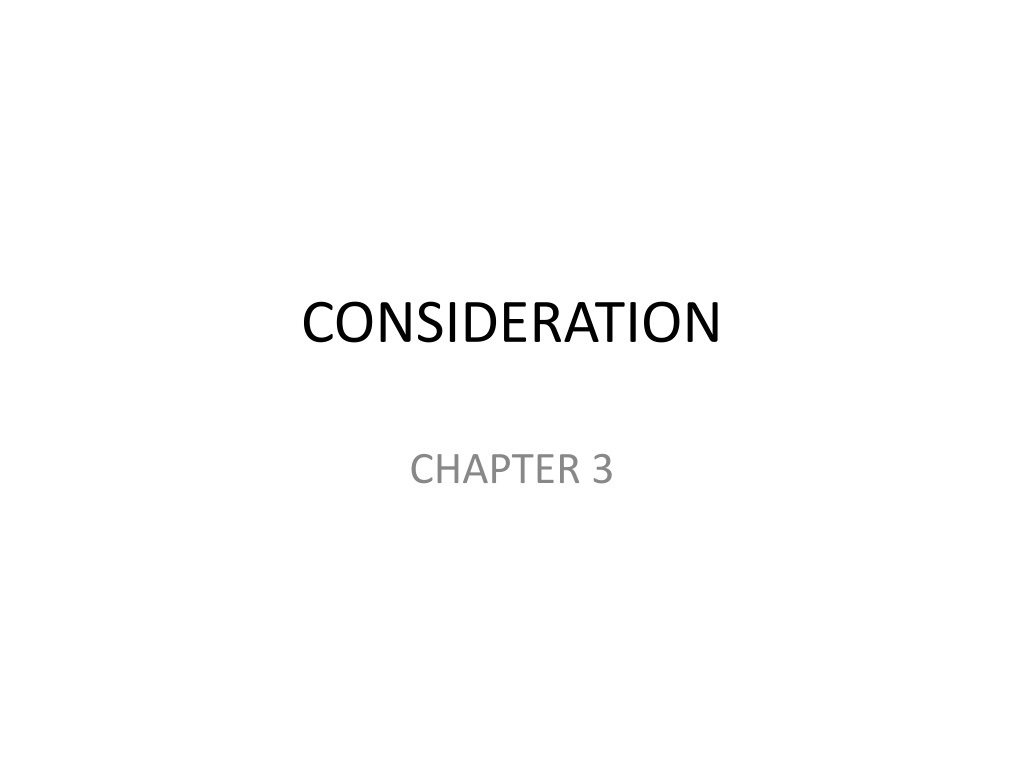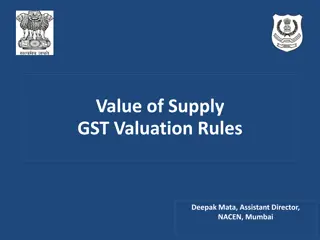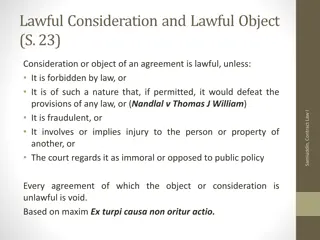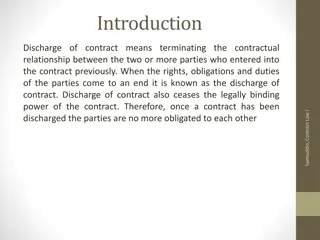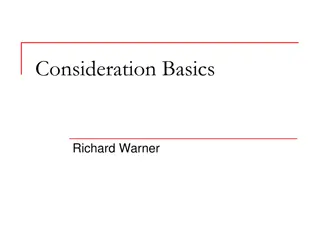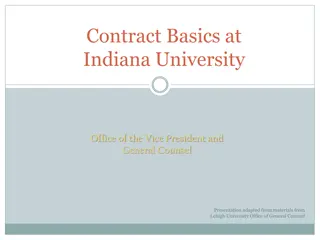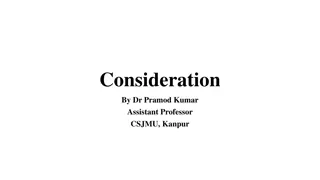Consideration in Contract Law
Consideration in contract law is essential for a valid agreement. It involves an act, forbearance, or promise exchanged between parties. The content discusses the meaning, legal rules, and exceptions related to consideration, highlighting the importance of a lawful and valuable exchange for a contract's validity. It also touches on the limitations imposed on strangers to a contract in terms of suing or being sued, with exceptions such as insurance contracts and agreements through agents.
Download Presentation

Please find below an Image/Link to download the presentation.
The content on the website is provided AS IS for your information and personal use only. It may not be sold, licensed, or shared on other websites without obtaining consent from the author.If you encounter any issues during the download, it is possible that the publisher has removed the file from their server.
You are allowed to download the files provided on this website for personal or commercial use, subject to the condition that they are used lawfully. All files are the property of their respective owners.
The content on the website is provided AS IS for your information and personal use only. It may not be sold, licensed, or shared on other websites without obtaining consent from the author.
E N D
Presentation Transcript
CONSIDERATION CHAPTER 3
MEANING AND DEFINITION S 2(d) When at the desire of the promisor, the promisee or any other person has done or abstained from doing or does or abstains from doing or promises to do or abstain from doing something, such act or abstinence or promise is called a consideration for the promise E.g. A offers to sell his watch for Rs 2000 to B. A s promise to sell the watch is the consideration for B s promise to pay Rs 2000 and B s promise to pay 2,000 is the consideration for A s promise to sell the watch.
LEGAL RULES FOR CONSIDERATION 1. Act done at the desire of the promisor X spent Rs. 10 lakhs on the construction of shops at the request of the collector of the district. In consideration of this, Y a shopkeeper promised to pay some money to X . It was held the agreement was void being without consideration because X had constructed the shops at the desire of the collector and not at the desire of Y ( Durga Prasad v Baldeo (1880)
2. Consideration may be past, present or future Past consideration- prepaid card Present consideration- PCO Future consideration post paid card 3. Of some value- watch costing Rs.20,000 sold at 18,000. need not be market value 4. Real and not illusory for e.g. land worth Rs. 25 lakhs sold at 2 lakhs 5. Something other than the promisor s existing obligation 6. Lawful
STRANGER TO A CONTRACT CANNOT SUE OR SUED Only the parties to the contract can sue or be sued There has to be some relationship between the parties. For e.g. offerer and the offeree Stranger/ Third party to a contract cannot sue or be sued EXCEPTIONS TO THE RULE 1. Assignee e.g. Official receiver can realise money from the debtors of the firm, though he is not a party to the credit agreement.
2. Insurance contract Under the Motor vehicles act, the owners of the vehicles are required to take out third party risk insurance contracts. e.g. A has a car and has taken a third party insurance. B gets hurt on account of accident with A s car. B can enforce the insurance contract although not a party to the contract 3. Trust Beneficiary 4. Agreements through an Agent A contract entered by an agent with a third party on behalf of the principal can be enforced by the principal against the third party. e.g. A appoints B as his agent to buy 100 bales of cotton from C. After entering into a contract, C refuses to perform. A can bring an action against C.
UNLAWFUL CONSIDERATIONS AND OBJECTS( S 10) S. 23 of contract act lists out unlawful objects The consideration or object of an agreement is lawful unless:- 1. It is forbidden by law 2. Of such a nature, if permitted would defeat the provisions of the law 3. Is fraudulent 4. Involves or implies injury to the person or property of another 5. The court regards it as immoral 6. Is opposed to public policy
